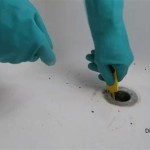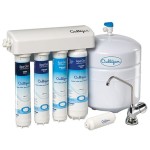How to Remove Sink Odor
A foul odor emanating from your kitchen or bathroom sink can be a truly unpleasant experience. This issue can arise from various sources, including food debris, stagnant water, mold, and even sewer gas. Fortunately, there are effective methods to tackle sink odor and restore a fresh and pleasant atmosphere in your home. This article will explore some proven techniques for eliminating sink odor, providing you with the knowledge and tools to effectively address this common household problem.
1. Address the Source of the Odor
The first step in resolving sink odor is to identify and address the source. This involves a thorough inspection of the sink and its surrounding areas. Begin by checking the drain for any visible debris, such as food particles, hair, or soap scum. These materials can decompose and create an offensive smell. Remove any visible obstructions with a drain snake or plunger.
If you suspect a deeper blockage, consider using a commercial drain cleaner. However, be cautious while using these products, as they can be corrosive. Follow the manufacturer's instructions carefully and ensure proper ventilation during application. Remember, drain cleaners are a temporary solution and may not address the root cause of the odor.
Beyond the drain, inspect the sink's trap. This U-shaped pipe beneath the sink holds a small amount of water, acting as a barrier against sewer gases. If the trap is dry, sewer gas can escape, leading to a foul odor. To resolve this, simply pour a cup of water into the trap to restore the water seal.
2. Clean and Disinfect the Sink
After addressing any obvious blockages, it's essential to thoroughly clean and disinfect the sink. Start by removing any visible debris and wiping down the sink with a mild dish soap solution. For deeper cleaning, use a baking soda paste mixed with water. Apply the paste to the sink surface and let it sit for a few minutes before scrubbing with a non-abrasive sponge.
After cleaning, disinfect the sink with a solution of bleach and water. Use a ratio of 1 part bleach to 10 parts water. Apply the solution with a sponge or cloth and let it sit for a few minutes before rinsing thoroughly. This step is vital for killing bacteria and mold that may contribute to the odor.
Beyond the sink itself, remember to clean the surrounding areas. Wipe down the countertops, backsplash, and cabinet doors. This ensures a comprehensive approach to odor removal.
3. Utilize Natural Odor Eliminators
Natural odor eliminators are a safe and effective alternative to chemical-based solutions. Many household ingredients can neutralize unpleasant smells and leave behind a pleasant fragrance. Here are some popular options:
Baking Soda: This versatile pantry staple is known for its odor-absorbing properties. Create a paste with baking soda and water and apply it to the sink, letting it sit for 30 minutes before rinsing.
Vinegar: Vinegar is a natural disinfectant and deodorizer. Pour a cup of vinegar down the drain followed by a cup of boiling water. This solution helps to break down grease and eliminate odor-causing bacteria.
Citrus Fruit Peels: The natural oils in citrus fruit peels, such as lemon or orange, can effectively mask unpleasant smells. Place a few peels in the sink, allowing the fragrance to permeate the area.
4. Prevent Future Odor
Once you've successfully eliminated the sink odor, it's crucial to implement preventive measures to prevent its recurrence. Here are some tips:
Regular Cleaning: Establish a routine of cleaning your sink regularly. This involves removing visible debris, wiping down the surface, and disinfecting with a bleach solution.
Proper Disposal: Avoid pouring grease or oil down the drain. These substances can solidify and create blockages, leading to odor. Dispose of grease and oil properly by using a grease trap or pouring them into a container for disposal.
Use a Drain Cover: Installing a drain cover can help to prevent hair and other debris from entering the drain, contributing to blockages and odors.
Ventilate the Area: Ensure proper ventilation in your kitchen or bathroom. This can help to dissipate odors and prevent them from accumulating.
Following these tips can significantly reduce the likelihood of future sink odor issues. By addressing the underlying causes, cleaning and disinfecting regularly, and practicing preventative measures, you can ensure a fresh and pleasant environment in your home.

How To Remove Sink Odor With Baking Soda And Vinegar Zep Drain Defense Prevent

How To Clean A Smelly Drain Easy Diy Fixes For Foul Odors

How To Clean A Stinky Sink Drain

How To Clean A Smelly Drain Easy Diy Fixes For Foul Odors

Deodorize A Kitchen Sink That Smells 5 Ways

How To Get Rid Of A Smelly Sink Drain 10 Ways Proven Work
:max_bytes(150000):strip_icc()/__opt__aboutcom__coeus__resources__content_migration__mnn__images__2018__08__sink_drain-351af8e441034f319fe07f00c091d8b6.jpg?strip=all)
How To Clean A Smelly Drain Naturally

How To Clean A Smelly Drain Easy Diy Fixes For Foul Odors

How To Remove Sink Odor With Baking Soda And Vinegar Zep Drain Defense Prevent

How To Remove Musty Odors From Kitchen Sink Water Damage







